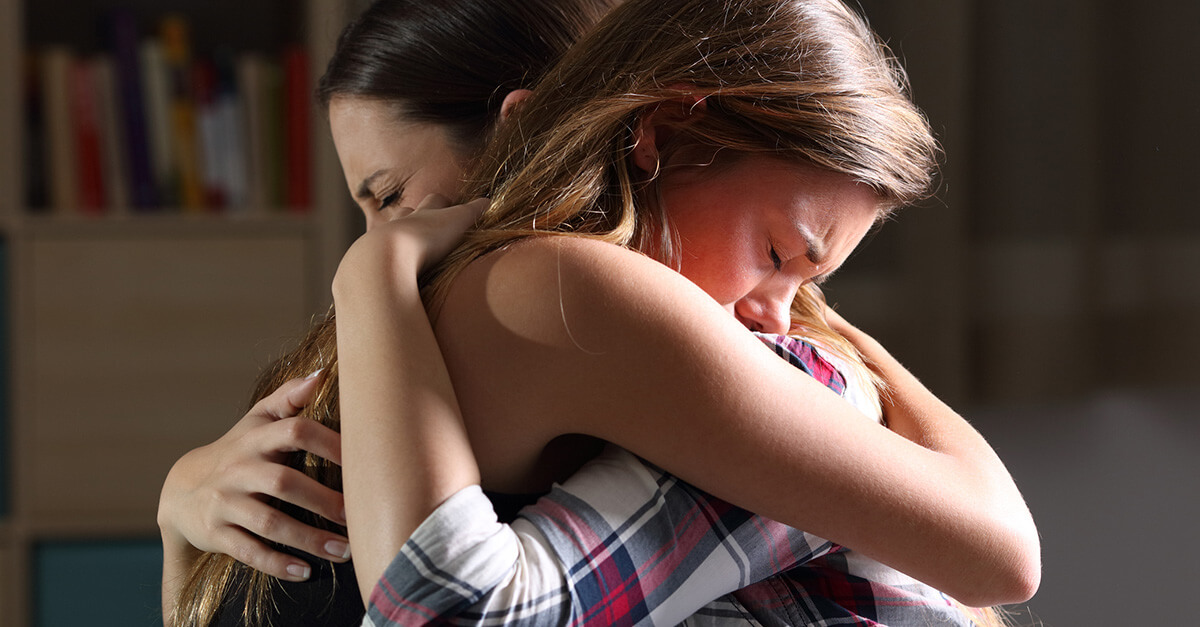3 ways to cope with grief


Feelings of anguish and grief are natural responses when you lose someone you care about. This pain may feel overwhelming, especially if the loss was unexpected. But even when you know your loved one is ill or aging, their departure from the world can still come as a shock. When you’re grieving, it’s important to be gentle with yourself and give yourself time to mourn and heal.
From the community: “…you must have been very close to your grandmother..that was probably a very special relationship..grief has no time limit..my brother passed away 5 years ago and i still feel a deep sadness when i think about him..i don`t have the unbearable pain like i did..but his son still does..have you tried grief counseling..sometimes if it affects your daily life that you can`t live your life and do the things you use to do..counseling may be the way to go...like you said grief isn`t straight forward..when my mother died it was really hard for me..she died on dec 23td so it was right through the holidays planning a funeral,,etc..i spent that winter making a photo album of her life..it was really cathartic ..at the end of it i t yped up a story of her life and glued it to the back cover of the album…” – Inspire member
What are the types of grief?
Depending on your loss, you may experience one of these unique types of grief:
Anticipatory grief occurs when you know someone’s death is imminent, perhaps due to an illness or advanced age. Caregivers may be more prone to this type of grief. You may feel angry about the impending loss, instead of sad. Anticipatory grief can be helpful. You can use the time to prepare for the loss, make the most of the time you have with your loved one, and say your goodbyes.
Complicated grief affects about 1 in 10 people who experience a loss. It’s an intense, persistent feeling that often affects your ability to resume daily living and enjoy life. You become stuck in a state of bereavement and have a difficult time accepting that your loved one is gone. Complicated grief increases your risk of depression and even suicide.
Disenfranchised grief follows a loss that’s difficult to openly mourn. You may experience this type of grief when you feel like others don’t understand your loss, such as a miscarriage. Losing someone to situations that carry stigmas like substance use disorder, mental health disorder, or suicide can also cause this type of grief.
What are the emotional signs of grief?
Each of us responds differently to loss and grief. You may experience a mix of these feelings:
Anger: You may be angry at the injustice of losing a loved one to an illness or unexpected trauma. Some people are upset that they must go on without their loved one.
Fear: It’s normal to have worries or fears about what your future will look like. Losing someone can make you fearful about your own mortality. For some people, intense fears or worries after a loss can lead to panic attacks.
Guilt: You may feel guilty about things you said or the amount of time you spent with your loved one when they were alive. If you were their caregiver, you may feel relieved (and guilty) to be free of those responsibilities and stress. Sometimes, it’s hard to shake the feeling that you could have done something to prevent a loved one’s death.
Sadness: Profound sadness is one of the most common grief symptoms. You may feel empty, emotionally unstable, and cry a lot.
Shock and disbelief: It takes time to accept a loss, especially one that is sudden. You may have trouble believing and accepting that you won’t see your loved one again.
From the community: “grief and guilt…about 5 months ago, my boyfriend had died from an overdose in my bathroom. i was the one that found him. while i have technically moved on with my life, im still having a hard time with his death. i have nightmares at least 4 times a week and i constantly feel guilty. like i wish i couldve done more, even though i know its not my fault. i just dont know what to do, i just want to be able to sleep and go on with my life. i know i cannot change anything but i still feel so guilty about it.” – Inspire member
What are the physical signs of grief?
Grief affects your physical health too. You may experience:
body aches and pains
extreme fatigue
insomnia
loss of appetite and weight loss, or an increased appetite and weight gain
upset stomach, nausea, and diarrhea
From the community: “...Grief has no timetable, no limit, and you are not a bother or a burden because you need to talk and have someone listen to you... Persisting in prayer, trying to talk to people. If the people around you are not interested in being there for you, then by all means, please seek maybe a grief support group, or keep venting on this forum, maybe a hobby that can help you meet new people such as a walking/running/biking group, book club, crafting, whatever your interests are to avoid isolation. And if you need a doctor's help, there is no shame in that. In the meantime, all we can do is hold on to the promises of a better future and I wish you the very best.” – Inspire member
How can you cope with grief?
You may find it helpful to take these steps while going through the grieving process:
practice patience and kindness
find healthy ways to grieve
lean on others
1. Practice patience and kindness
Grief doesn’t follow a timeline. It’s an ongoing process of letting go, acceptance, and learning to live with your loss. It will take time to accept the finality of the death and re-envision a different future. During this time, it’s best to not make any big life decisions like selling the home you shared with your loved one, moving to a new area, or switching careers.
2. Find healthy outlets to grieve
While it may be tempting to want to hide away from the world, it’s important to make your emotional and physical health a priority. You can do this by:
avoiding substances like alcohol or drugs, which can act as depressants
being physically active (consider going for walks outside with a friend), eating nutritious foods, and improving your sleep habits
channeling your grief through journaling, scrapbooking, or gardening
honoring your loved one by planting a tree in their memory, making a charitable contribution, or gathering friends together to share stories and memories
participating in a fundraiser like a charity walk for an organization that helped your loved one
volunteering at a hospital or charitable organization
From the community: “Bi polar and grief are together have to be the hardest. I am Diane and I have been diagnosed with bipolar one disorder. My husband of 15 years is dying and I am so far down I don't know how to be strong enough to deal with all of this. I wish I could go with him and I know I can't. He has been my rock through all the bad times and the good. It took me a long time to find the other half of me. I try to just give thanks for evey day I get but omg this is a horrible pain I just don't understand why it's not fair and I t just gets harder hour by hour.” – Inspire member
3. Lean on others
When you’re going through a traumatic and stressful time, it often helps to seek the support of family and friends. The people who care about you want to help, although they may be unsure how to do so. They may also worry about upsetting you by talking about the loss. Accept offers of help and companionship, and don’t hesitate to let them know what you need as you grieve.
Many people who are grieving find it helpful to talk to a mental health professional. Psychotherapy (talk therapy) can help you navigate the loss and find healthful ways to manage the grief. Therapy is a must if you experience complicated grief, depression, anxiety, or suicidal thoughts, or if you find yourself turning to alcohol or drugs to cope with the grief. You should find a therapist who has experience with grief counseling.
You may also benefit from participating in a bereavement support group either in person or online like Mental Health America’s mental health support group and community on Inspire.
Sources
Grief: Coping with the loss of your loved one. American Psychological Association. January 2020.
Coping with grief and loss. HelpGuide. August 2022.
Grief: Coping with reminders after a loss. Mayo Clinic. November 2020.
Begley M. Coping with grief: 7 things to remember when dealing with loss. Memorial Sloan Kettering Cancer Center. March 1, 2019.
Coping with grief: Life after loss. National Institutes of Health News in Health. October 2017.
CG is a form of grief that takes hold of a person’s mind and won’t let go. The Center for Prolonged Grief.
Disclaimer
Member comments are lightly edited for length and to remove identifying information but are otherwise reproduced as they appear in the community as part of public posts.
This content is for general informational purposes only and does not necessarily reflect the views and opinions of any organization or individual. The content should not be used as a substitute for professional medical advice, diagnosis, or treatment. Please consult your healthcare provider about any questions you may have regarding a medical condition.




